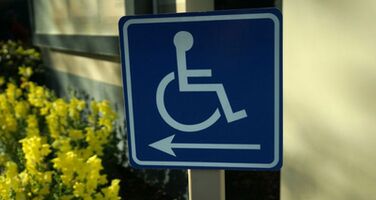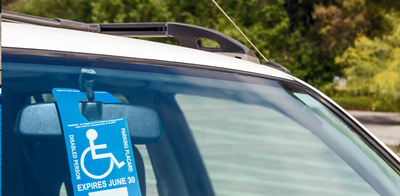
Handicap Placard vs. Handicap License Plates: Which is Right for You in Nevada?
Introduction
Living with a disability can present unique challenges when it comes to mobility and accessibility. Thankfully, there are various solutions available to help individuals with disabilities navigate the world more easily. In Nevada, two common options for individuals with disabilities are the disabled placard and disabled license plates. But which one is the right choice for you? In this article, we will explore the differences between a handicap placard and handicap license plates in Nevada, and help you determine which option suits your needs best.
Handicap Placard: Convenience and Flexibility
What is a Handicap Placard?
A handicap placard, also known as a handicap permit, is a removable identification card that can be hung from the rearview mirror or placed on the dashboard of a vehicle. This placard is issued to individuals with disabilities, allowing them to park in designated accessible parking spaces.
Eligibility for a Handicap Placard
To be eligible in Nevada, you must have a qualifying disability that impairs your mobility. It can be permanent or temporary, and it must meet certain criteria outlined by the Nevada Department of Motor Vehicles (DMV). Some common disabilities that may qualify for a disability sign include:
- Mobility impairments
- Respiratory conditions
- Visual impairments
- Cardiac conditions
Obtaining a Handicap Placard in Nevada
To obtain a Nevada handicap placard, you will need to submit an application to the DMV. The application requires medical certification from a licensed healthcare provider, stating your disability and the duration for which the placard is needed. Once approved, you will receive your tag which is valid for a specified period of time.
Benefits of a Handicap Placard
It offers several advantages to individuals with disabilities:
Convenience: You can park in designated accessible parking spaces, which are often located closer to entrances, reducing the distance you need to travel.
Flexibility: The placard is not tied to a specific vehicle, allowing you to use it in different cars as needed. This flexibility can be particularly beneficial if you frequently use rental or borrowed vehicles.
Temporary Use: If you have a temporary disability, such as a broken leg or recovering from surgery, the sign provides temporary accessibility during your recovery period.
Handicap License Plates: Permanence and Vehicle Dedication
What are Disability License Plates?
Disability license plates, on the other hand, are special license plates issued to individuals with disabilities. These plates replace the standard license plates on your vehicle and indicate that the vehicle is being driven by someone with a disability.
Eligibility for Disability License Plates
To qualify for license plates in Nevada, you must meet the same eligibility criteria as for a disability sign. The disability must significantly impair your mobility, and you must provide the necessary medical certification.
Applying for License Plates
You will need to complete an application and submit it to the DMV, along with the required medical certification. Once approved, you will receive your new license plates, which should be installed on your vehicle.
Benefits of License Plates
License plates offer unique benefits that may make them the preferred choice for some individuals:
Permanence: Unlike a removable placard, license plates are permanently affixed to your vehicle. This eliminates the need to hang or display a placard every time you park, providing a more convenient solution.
Vehicle Dedication: License plates are associated with a specific vehicle, meaning only that vehicle can utilize the accessible parking spaces. This can be advantageous if you have a designated accessible vehicle or if you prefer the convenience of not transferring the placard between vehicles.
Placard vs. License Plates: Which is Right for You in Nevada?
Choosing between a placard and license plates ultimately depends on your personal preferences and circumstances. Here are a few considerations to help you make an informed decision:
Temporary vs. Permanent Disability: If you have a temporary disability, such as a short-term injury or medical condition, a handicap placard may be more suitable. It provides the flexibility to use different vehicles and can be easily transferred as needed. However, if you have a permanent disability or prefer the convenience of not having to display a placard, license plates offer a more permanent solution.
Convenience vs. Vehicle Dedication: Handicap placards offer convenience and flexibility, allowing you to use accessible parking spaces in any vehicle you occupy. On the other hand, handicap license plates provide the benefit of vehicle dedication, ensuring that only your vehicle can utilize the accessible parking spaces. If you have a designated accessible vehicle or prefer not to transfer a placard between vehicles, license plates may be the better option.
Long-Term Planning: If you anticipate needing accessibility accommodations for an extended period or permanently, license plates may be a more suitable choice. They eliminate the need to renew or reapply for a placard periodically and provide a more seamless solution for daily accessibility needs.
Frequently Asked Questions
Can I apply for both a tag and license plates in Nevada?
- Yes, you can apply for both a tag and license plates if you meet the eligibility criteria for both. However, it's important to note that you can only use one at a time. Using both simultaneously would be considered a violation.
Can I lend my tag or license plates to someone else?
- No, tags and license plates are issued for the use of the individual to whom they are registered. Lending them to someone else, even if they have a disability, is against the law and can result in penalties.
Can I use my tag or license plates in other states?
- Yes, tags and license plates are generally recognized and honored in other states. However, it's essential to familiarize yourself with the specific rules and regulations of each state you plan to visit, as there may be some variations.
What should I do if my tag or license plates are lost or stolen?
- If your tag or license plates are lost or stolen, you should report the incident to the DMV immediately. They will guide you through the process of obtaining a replacement and may provide you with temporary documentation in the meantime.
Do tags or license plates expire?
- Yes, both placards and license plates have expiration dates. The duration of validity may vary depending on the type of disability and the state's regulations. It's crucial to renew your placard or license plates before they expire to ensure continued accessibility.
Can I park in any accessible parking space with a tag or license plates?
- No, you can only park in designated accessible parking spaces that are marked with the International Symbol of Access. Violating parking regulations can result in fines and penalties.
Conclusion
When it comes to choosing between a handicap placard and handicap license plates in Nevada, it's essential to consider your specific needs and preferences. The placard offers convenience, flexibility, and temporary accessibility, while license plates provide permanence and vehicle dedication. By understanding the benefits and limitations of each option, you can make an informed decision that best suits your situation. Remember to comply with all applicable laws and regulations to ensure a safe and accessible experience for yourself and others.
.png)






